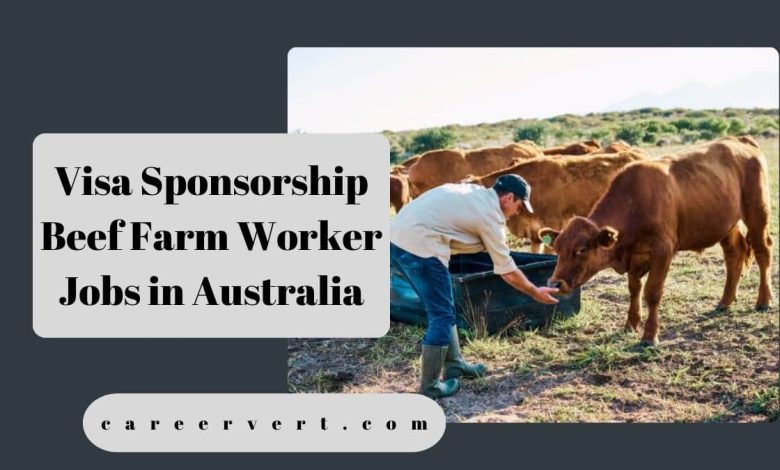Visa Sponsorship Beef Farm Worker Jobs in Australia 2025

The Australian cattle farm industry is a fundamental component of the agricultural region, distinguished by its exceptional meat and expansive pastures. Pig farm staff positions offer a valuable opportunity to reside and work in the country below for those who are interested in pursuing this dynamic discipline.
This guide will provide you with a comprehensive overview of the process if you are an international job seeker seeking a visa sponsorship position this quarter.
Key Points:
- Job Title: Beef Farm Worker
- Location: Various locations across Australia
- Visa Requirement: Visa sponsorship available (e.g., Temporary Skill Shortage (TSS) visa, Skilled Regional visa)
Check Also: Visa Sponsorship General Labourer Jobs in Australia
Requirements for Visa Sponsorship Beef Farm Worker Jobs in Australia:
In order to secure employment as a cattle farm worker in Australia, it is necessary to satisfy the following criteria:
- Physical Fitness: Beef ranching is a physically demanding occupation that requires extended periods of outdoor work in a variety of climates. It is imperative to possess an inordinate amount of physical endurance and health.
- Experience: Although certain positions may also necessitate prior agricultural or farming experience, numerous entry-level positions provide on-the-job training.
- Skills: It would be advantageous to possess fundamental abilities in the areas of animal care, machinery operation, and extensive farm maintenance.
- Language: Proficiency in the English language is indispensable for the successful engagement in conversation and the safety of the task.
- Work visa: A valid work visa is required for entry into Australia. This system can be facilitated by visa sponsorship through an organisation.
Benefits of Visa Sponsorship Beef Farm Worker Jobs:
- Legal Work Authorisation: Visa sponsorship guarantees that you are able to work legally in the country without encountering any immigration complications.
- No Formal Education Required: The majority of positions for beef farm labourers do not necessitate advanced qualifications, which makes them accessible to a large number of foreign workers.
- Employer-Paid Visa & Work Permit: The visa and work permit procedure is often handled by employers, which alleviates the financial burdens placed on workers.
- Competitive Salaries and Overtime Compensation: Employees are compensated fairly, frequently with bonuses, overtime pay, and additional benefits.
- Subsidised or Free Housing and Meals: Numerous farm employers offer on-site lodging and occasionally meals, which reduces living expenses.
- Pathway to Permanent Residency (PR): Numerous countries provide provincial or rural immigration programs that facilitate the acquisition of PR for agricultural labourers.
- Opportunities for Family Sponsorship: Certain visa programs permit employees to bring their families with them after meeting specific criteria.
- Job Stability & High Demand: The beef farming industry is in constant need of labourers, which guarantees job security and consistent employment.
- Paid Leave and Work-Life Balance: In accordance with labour laws, employees are granted paid holidays, medical leave, and structured work hours.
- Safe and Regulated Work Conditions: In order to safeguard workers from exploitation, governments implement rigorous safety and labour regulations.
- Skills Development and Career Advancement: Workers acquire practical experience in the administration of farms, the handling of cattle, and the feeding of livestock, which can result in future career advancements.
- Healthcare and Social Benefits: Sponsored employees are eligible to participate in social security programs and receive free or subsidised healthcare.
- The opportunity to acquire knowledge: about contemporary farming methods is available on numerous cattle farms, which utilise sophisticated machinery and technology, which can provide valuable experience.
- Integration into the Local Agricultural Industry: Employment on a farm provides access to higher-paying positions in agribusiness, dairy farming, and livestock management.
- Citizenship Pathway: Upon obtaining permanent residency, workers may ultimately apply for citizenship and establish a permanent residence in the country.
Duties for Visa Sponsorship Beef Farm Worker Jobs:
The clean operation of the farm is contingent upon the performance of a diverse array of tasks by beef farm labourers. The following are typical responsibilities:
- agricultural Animal Care: The process of feeding, watering, and monitoring the health of agricultural animals. This may involve the provision of medication and assistance through veterinary methods.
- Fencing and Maintenance: The provision of farm infrastructure, equipment administration, and repair and maintenance of fencing are of the highest quality.
- Land Management: Support for pasture management, which includes sowing, mowing, and pasture management.
- Machine Operator: Perform a variety of tasks, such as feeding, moving livestock, and harvesting, by operating agricultural equipment such as tractors, loaders, and trucks.
- The process of maintaining accurate data regarding livestock, feed usage, and various agricultural activities is known as record keeping.
- Assistance with Breeding: Facilitating breeding applications by managing bulls and guaranteeing proper mating procedures.
Salary Expectations
The compensation of red meat farm labourers in Australia is contingent upon their job responsibilities, location, and discretion. The salary of an entry-level employee typically ranges from AUD 50,000 to 55,000 annually. Nevertheless, the annual salary of experienced employees can range from AUD 55,000 to $65,000.
Types of Jobs
- Stockman/stockwoman: Responsible for the management of livestock, including feeding, circumstance inspections, and preferred care.
- Farm Hand: Assists in the caring of animals, provides protection, and feeds them.
- Livestock Handling: Concentrates on the management and transportation of cattle, guaranteeing their safety and welfare.
- Ranch Manager: Responsible for the management of all aspects of farm operations, including strategic plans, budgeting, and a primary group of employees.
- Machinery Operation: Maintains and operates farm machinery that is employed for the purpose of grazing, pasture control, and other miscellaneous tasks.
- Breeding technician: Concentrates on the development of breeding programs that involve synthetic insemination and the resolution of breeding plans.
- Feed Specialist: Oversees the implementation of nutrient regimens for livestock and the distribution of feed.
- Veterinary Assistant: Provides support for veterinary care, which includes the administration of medications and the monitoring of animal health.
- Maintenance Man: Responsible for the maintenance and preservation of the farm’s infrastructure, which includes fencing and devices.
- Pasture Manager: Ensures that cattle are provided with exceptional conditions by overseeing pasture growth and grazing patterns.
Job Application Process
- Research: Begin by investigating red meat ranches in Australia that provide visa sponsorship. For example, industry-specific process forums and websites such as Indeed, Jora, and Seek can be beneficial.
- Draft your curriculum vitae: Customise your resume to emphasise relevant qualifications, competencies, and interests that are pertinent to animal husbandry and care.
- Apply for employment: Submit programs to farms that offer sponsorships. Include a cover letter that conveys your enthusiasm for the position and your readiness to relocate, and maintain a positive attitude.
- Relocation: Establish your relocation arrangements after your visa has been approved. This may also encompass the coordination of your travel to Australia and the reservation of accommodations.
Frequently Asked Questions:
-
What is the visa sponsorship for farm workers in Australia?
The Subclass 186 ENS visa program is an employer-sponsored option that grants you permanent residence in Australia. It comprises three Australian visa agricultural work streams, including a Labour Agreement stream. In this stream, your sponsoring employer must have a labour agreement in place.
-
Where is beef farming in Australia?
Queensland is by far the largest cattle-producing state, with twice as many cattle as New South Wales, the state with the second- largest cattle inventory.
-
How do I become a cattle farmer in Australia?
The law doesn’t require any degree or diploma to become a cattle farmer. However, if you want to have a substantial advantage over your competitors, then it would be beneficial to continuously learn about the cattle farming industry. One of the best ways to do that is by taking a cattle farming certification course.



